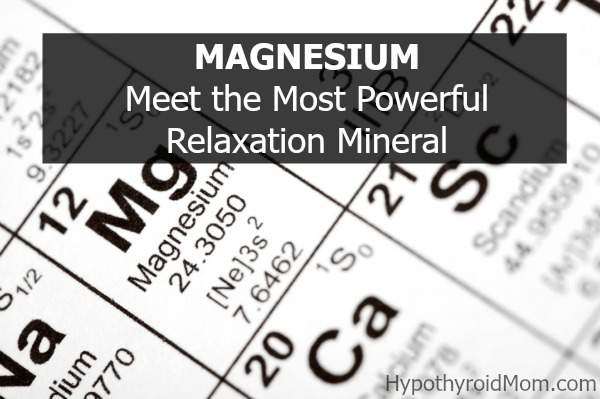
Discovering that I was severely deficient in magnesium turned out to be life-changing for me. For years I struggled with chronic constipation, nervousness, anxiety, headaches, persistent eyelid twitches, blurry vision at times, recurring bladder infections, kidney stones, frequent urination, sensitivity to bright lights and loud noises, tension in the upper back, shoulders, and neck, physical and mental fatigue, PMS, menstrual cramps, and the peculiar feeling that I couldn’t take a deep breath accompanied with frequent sighing. Then came the first time I was shaving my legs in the shower and I couldn’t feel my legs. The numbness and tingling scared me and I rushed to the doctor who had no answer for my questions.
It was thanks to a great new doctor who tested my RBC (red blood cell) magnesium that I discovered my serious magnesium deficiency and all the symptoms made sense. Supplementing with the magnesium glycinate mentioned in this article every night before bed has completely eliminated these symptoms and has helped me have better sleep on top of it all.
Written by Mark Hyman, MD, Medical Director at Cleveland Clinic’s Center for Functional Medicine
“Magnesium deficiency commonly occurs in critical illness and correlates with a higher mortality and worse clinical outcome in the intensive care unit (ICU)”, according to a study published in The Journal of Intensive Care Medicine.[1]
It also accounts for a long list of symptoms and diseases — which are easily helped and often cured by adding this nutrient. In fact, in my practice, this nutrient is one of my secret weapons against illness. Yet up to half of Americans are deficient in this nutrient and don’t know it.
I’m talking about magnesium.
It is an antidote to stress, the most powerful relaxation mineral available, and it can help improve your sleep.
I find it very funny that more doctors aren’t clued in to the benefits of magnesium, because we use it all the time in conventional medicine. But we never stop to think about why or how important it is to our general health or why it helps our bodies function better.
I remember using magnesium when I worked in the emergency room. It was a critical “medication” on the crash cart. If someone was dying of a life-threatening arrhythmia (or irregular heart beat), we used intravenous magnesium. If someone was constipated or needed to prepare for colonoscopy, we gave them milk of magnesia or a green bottle of liquid magnesium citrate, which emptied their bowels. If pregnant women came in with pre-term labor, or high blood pressure of pregnancy (pre-eclampsia) or seizures, we gave them continuous high doses of intravenous magnesium.
But you don’t have to be in the hospital to benefit from getting more magnesium. You can start taking regular magnesium supplementation today and see results.
The Relaxation Mineral
Think of magnesium as the relaxation mineral. Anything that is tight, irritable, crampy, and stiff — whether it is a body part or an even a mood — is a sign of magnesium deficiency.
This critical mineral is actually responsible for over 300 enzyme reactions and is found in all of your tissues — but mainly in your bones, muscles, and brain. You must have it for your cells to make energy, for many different chemical pumps to work, to stabilize membranes, and to help muscles relax.
When was the last time you had a good dose of seaweed, nuts, greens, and beans? If you are like most Americans, your nut consumption mostly comes from peanut butter.
That is why the list of conditions that are found related to magnesium deficiency is so long. In fact, there are over 3,500 medical references on magnesium deficiency!
Even so, this mineral is mostly ignored because it is not a drug, even though it is MORE powerful than drugs in many cases. That’s why we use it in the hospital for life-threatening and emergency situations like seizures and heart failure.
You might be magnesium deficient if you have any of the following symptoms:
- Muscle cramps
- Muscle twitches
- Insomnia
- Irritability
- Sensitivity to loud noises
- Anxiety
- Autism
- ADD
- Palpitations
- Angina
- Constipation
- Anal spasms
- Headaches
- Migraines
- Fibromyalgia
- Chronic fatigue
- Restless Legs Syndrome
- Asthma
- Kidney stones
- Diabetes
- Obesity
- Osteoporosis
- High blood pressure
- PMS
- Menstrual cramps
- Irritable bladder
- Irritable bowel syndrome
- Reflux
- Trouble swallowing
Magnesium deficiency has even has been linked to inflammation in the body and higher CRP levels, considered the best new test to predict heart disease.
In our society, magnesium deficiency is a huge problem. By conservative standards of measurement (blood, or serum, magnesium levels), 65 percent of people admitted to the intensive care unit — and about 15 percent of the general population — have magnesium deficiency.
But this seriously underestimates the problem, because a serum magnesium level is the LEAST sensitive way to detect a drop in your total body magnesium level. So rates of magnesium deficiency could be even higher!
The reason we are so deficient is simple: Many of us eat a diet that contains practically no magnesium — a highly-processed, refined diet that is based mostly on white flour, meat, and dairy (all of which have no magnesium).
When was the last time you had a good dose of sea vegetables (seaweed), nuts, greens, and beans? If you are like most Americans, your nut consumption mostly comes from peanut butter, and mostly in chocolate peanut butter cups.
Much of modern life conspires to help us lose what little magnesium we do get in our diet. Magnesium levels are decreased by excess alcohol, salt, coffee, phosphoric acid in colas, profuse sweating, prolonged or intense stress, chronic diarrhea, excessive menstruation, diuretics (water pills), antibiotics and other drugs, and some intestinal parasites. In fact, in one study in Kosovo, people under chronic war stress lost large amounts of magnesium in their urine.
This is all further complicated by the fact that magnesium is often poorly absorbed and easily lost from our bodies. To properly absorb magnesium we need a lot of it in our diet, plus enough vitamin B6, vitamin D, and selenium to get the job done.
A recent scientific review of magnesium concluded, “It is highly regrettable that the deficiency of such an inexpensive, low-toxicity nutrient results in diseases that cause incalculable suffering and expense throughout the world.” [2] I couldn’t’ have said it better myself.
It is difficult to measure and hard to study, but magnesium deficiency accounts for untold suffering — and is simple to correct. So if you suffer from any of the symptoms I mentioned or have any of the diseases I noted, don’t worry — it is an easy fix!! Here’s how.
Stop Draining Your Body of Magnesium
- Limit coffee, colas, salt, sugar, and alcohol
- Learn how to practice active relaxation
- Check with your doctor if your medication is causing magnesium loss (many high blood pressure drugs or diuretics cause loss of magnesium)
Eat Foods High in Magnesium
Include the following in your diet as often as you can:
Kelp, wheat bran, wheat germ, almonds, cashews, buckwheat, brazil nuts, dulse, millet, pecans, walnuts, rye, tofu, soy beans, brown rice, figs, dates, collard greens, shrimp, avocado, parsley, beans, barley, dandelion greens, and garlic
Take Magnesium Supplements
- The RDA (the minimum amount needed) for magnesium is about 300 mg a day. Most of us get far less than 200 mg.
- Some may need much more depending on their condition.
- Most people benefit from 400 to 1,000 mg a day.
- Speak to your doctor about supplementation. Start with having your RBC magnesium tested.
- The most absorbable forms are magnesium citrate, glycinate, taurate, or aspartate, although magnesium bound to Kreb cycle chelates (malate, succinate, fumarate) are also good.
- Avoid magnesium carbonate, sulfate, gluconate, and oxide. They are poorly absorbed (and the cheapest and most common forms found in supplements).
- If you take a magnesium supplement like magnesium citrate and find diarrhea a problem, try switching to magnesium glycinate.
- Taking a hot bath with Epsom salts (magnesium sulfate) is a good way to absorb and get much needed magnesium.
People with kidney disease or heart disease should take magnesium only under a doctor’s supervision.
So if you’re coping with the symptoms here, relax! Magnesium is truly a miracle mineral. It is essential for lifelong vibrant health.
About Mark Hyman, MD
Dr. Mark Hyman is Medical Director at Cleveland Clinic’s Center for Functional Medicine, Founder of The UltraWellness Center (in Lenox, MA), regular contributor to the Today show, Good Morning America, and The Dr. Oz Show, and a ten-time #1 New York Times Bestselling author.
References:
1. Tong, GM and RK Rude. 2005. Magnesium deficiency in critical illness. J Intensive Care Med 20 (1):3-17. Review.
2. S. Johnson. 2001. The multifaceted and widespread pathology of magnesium deficiency. Med Hypotheses 56(2): 163-70.



Very interesting! I am diagnosed Magnesium Deficient with many symptoms above. The most bothering symptom is sighing, unable to breathe deep and sleeplessness. I am on Magnesium supplements from last one week, how long dis it take for symptoms to correct itself?